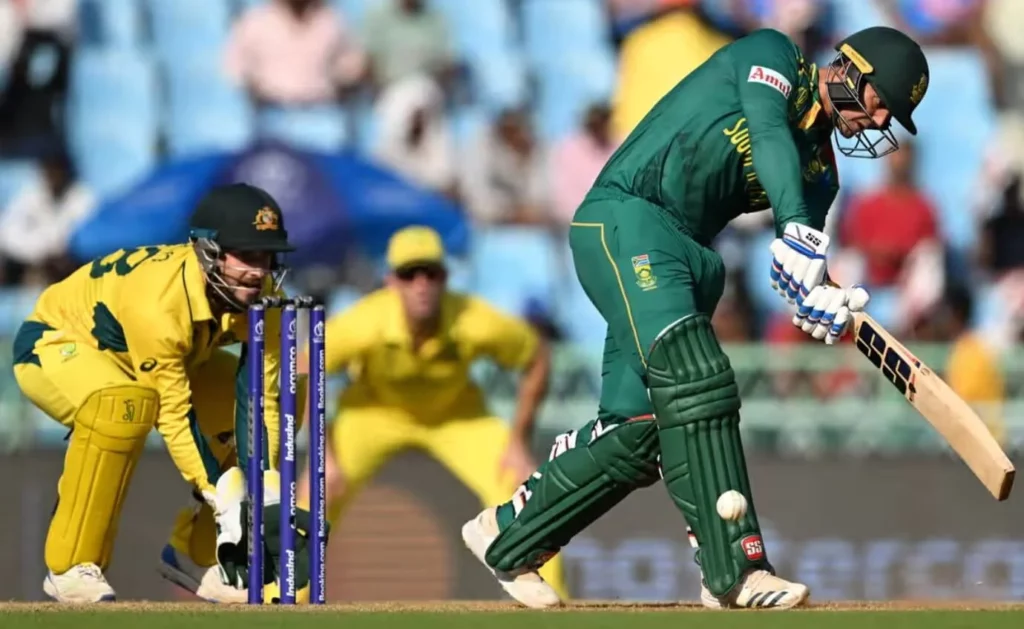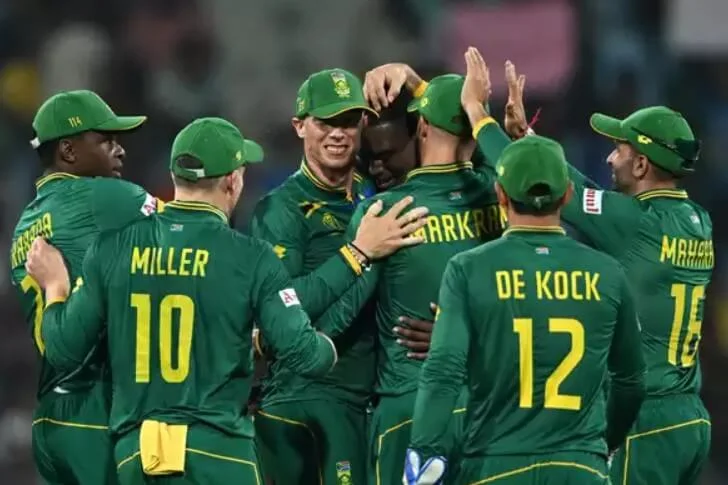
In a showdown at Lucknow, South Africa effortlessly showcased their supremacy, painting a vivid picture of discipline, determination, and dominance. The Proteas, with their well-calibrated gameplay, managed to overshadow an Australian side known for its resilience and skill. Quinton de Kock, serving as the linchpin of the batting unit, coupled with a fiery bowling attack, set the tempo and narrative of the match.
Australia, a team synonymous with fighting spirit and comebacks, found themselves on the back foot, struggling to find answers to South Africa’s relentless pressure. The match not only served as a testament to South Africa’s rising prowess in international cricket but also signaled a need for introspection for the Aussies. With the World Cup journey still unfolding, both teams will take away significant lessons from this face-off.
Setting the Stage: The South African Innings
Quinton’s prowess with the bat was evident as he steadied the Proteas’ innings. Notching up another World Cup century, he capitalized on Australia’s errors and set the tone for South Africa. While his innings started with aggression, his ability to adapt to changing game scenarios was truly commendable.
“In cricket, as in life, adaptability is key. It’s not just about power but understanding the nuances of the game” — Cricketing Legend
Temba Bavuma played a solid supporting role, building a crucial partnership with de Kock that gave South Africa the upper hand. Aiden Markram, with a fluent half-century, further enhanced the score, ensuring that the tempo never waned.
Australia’s Bowling Conundrum
The Aussies appeared to misjudge the pitch conditions, failing to utilize the movement of the new ball. Their struggle to find the right length and pace was evident throughout South Africa’s innings. Additionally, the fielders didn’t help their cause, with multiple missed opportunities that added to their woes.
| Key Highlights from SA’s Innings | |
| Player | Performance |
| Quinton de Kock | 109 runs |
| Aiden Markram | 56 runs |
| Glenn Maxwell | 2 wickets for 34 runs |
| Mitchell Starc | 2 wickets for 53 runs |
Australia’s Dismal Response
Facing a formidable total, Australia’s response was less than ideal. South Africa’s bowlers, notably Marco Jansen and Lungi Ngidi, made early inroads, unsettling the top order.
The first Powerplay saw Australia losing Mitchell Marsh, David Warner, and the reliable Steve Smith. Their dismissals not only boosted the morale of the South African team but also drastically shifted the game’s momentum.
However, a contentious decision during Smith’s dismissal had everyone talking.
“In real-time, it looked not out, but technology showed otherwise” — Match Commentator
Kagiso Rabada’s first spell was a testament to his skill and adaptability. He had Smith adjudged LBW, a decision that even surprised some Protea players. Josh Inglis’s dismissal soon after accentuated Australia’s precarious position.
The spin also came into play, making the Australian chase even more challenging. Glenn Maxwell’s early departure to Keshav Maharaj and Marcus Stoinis’s controversial exit further dented their hopes.
The Lone Battle: Labuschagne and Starc’s Effort
Amidst the chaos, Marnus Labuschagne and Mitchell Starc tried to resurrect the innings. Their partnership added some respectability to the Australian score. As dew set in, making batting conditions favorable, the duo tried capitalizing, but the damage was already done.

South African Dominance: A Tactical Masterclass
South Africa’s strategy was impeccable. Their reading of the pitch, understanding of the game situation, and execution of plans was textbook perfect. Their bowlers exploited the conditions brilliantly, ensuring they applied constant pressure on the Australians.
| SA’s Bowling Figures | |
| Bowler | Performance |
| Kagiso Rabada | 3 wickets for 33 runs |
| Keshav Maharaj | 2 wickets for 30 runs |
| Tabraiz Shamsi | 2 wickets for 38 runs |
South Africa’s win was a combination of strategic brilliance and individual excellence. From de Kock’s masterclass with the bat to the bowlers’ collective effort, it was a performance that will be remembered for a long time. On the other hand, Australia will reflect on this game, looking for improvements as they move forward in the tournament.





















